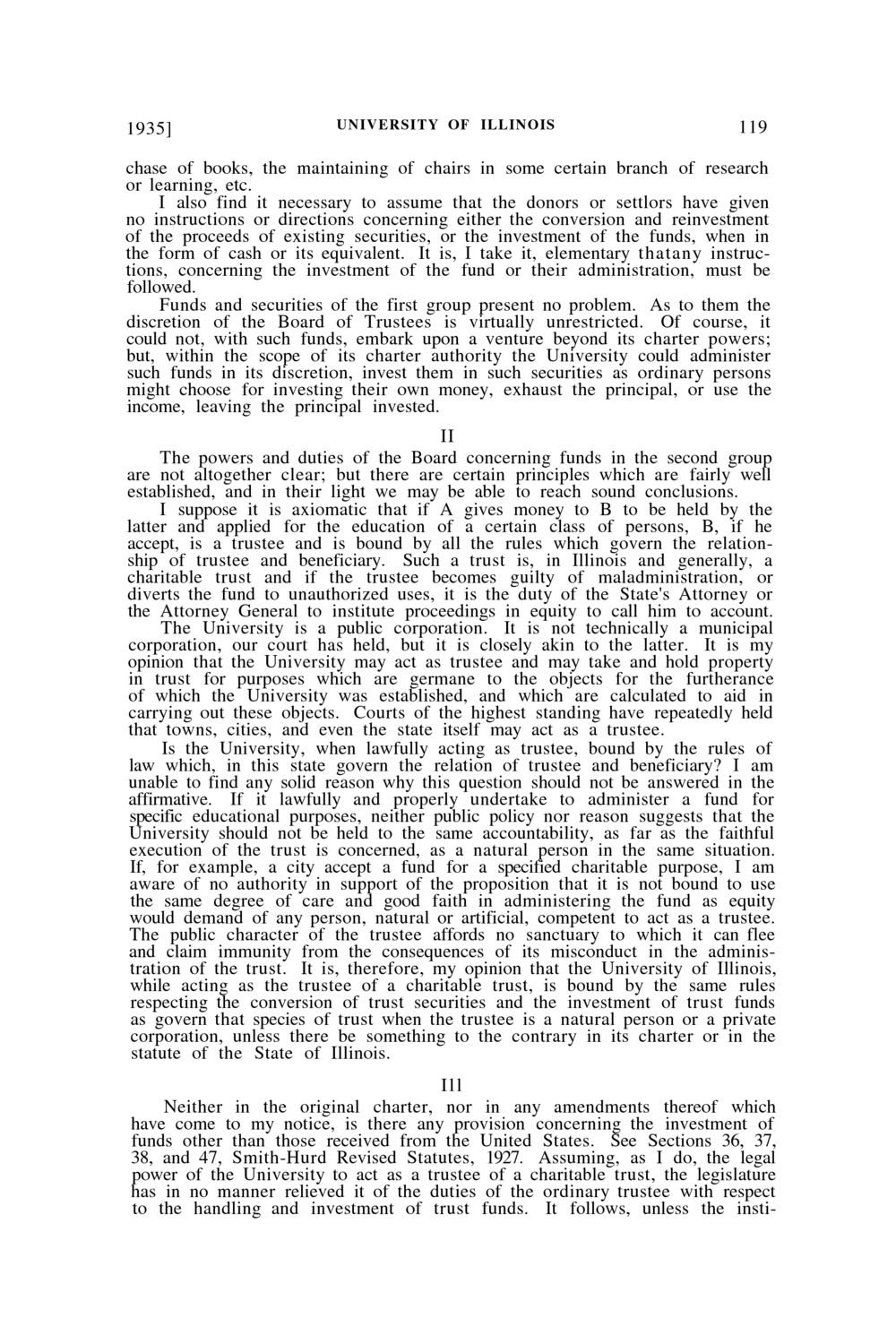| |
| |
Caption: Board of Trustees Minutes - 1936
This is a reduced-resolution page image for fast online browsing.

EXTRACTED TEXT FROM PAGE:
1935] UNIVERSITY OF ILLINOIS 119 chase of books, the maintaining of chairs in some certain branch of research or learning, etc. I also find it necessary to assume that the donors or settlors have given no instructions or directions concerning either the conversion and reinvestment of the proceeds of existing securities, or the investment of the funds, when in the form of cash or its equivalent. It is, I take it, elementary thatany instructions, concerning the investment of the fund or their administration, must be followed. Funds and securities of the first group present no problem. As to them the discretion of the Board of Trustees is virtually unrestricted. Of course, it could not, with such funds, embark upon a venture beyond its charter powers; but, within the scope of its charter authority the University could administer such funds in its discretion, invest them in such securities as ordinary persons might choose for investing their own money, exhaust the principal, or use the income, leaving the principal invested. II The powers and duties of the Board concerning funds in the second group are not altogether clear; but there are certain principles which are fairly well established, and in their light we may be able to reach sound conclusions. I suppose it is axiomatic that if A gives money to B to be held by the latter and applied for the education of a certain class of persons, B, if he accept, is a trustee and is bound by all the rules which govern the relationship of trustee and beneficiary. Such a trust is, in Illinois and generally, a charitable trust and if the trustee becomes guilty of maladministration, or diverts the fund to unauthorized uses, it is the duty of the State's Attorney or the Attorney General to institute proceedings in equity to call him to account. The University is a public corporation. It is not technically a municipal corporation, our court has held, but it is closely akin to the latter. It is my opinion that the University may act as trustee and may take and hold property in trust for purposes which are germane to the objects for the furtherance of which the University was established, and which are calculated to aid in carrying out these objects. Courts of the highest standing have repeatedly held that towns, cities, and even the state itself may act as a trustee. Is the University, when lawfully acting as trustee, bound by the rules of law which, in this state govern the relation of trustee and beneficiary? I am unable to find any solid reason why this question should not be answered in the affirmative. If it lawfully and properly undertake to administer a fund for specific educational purposes, neither public policy nor reason suggests that the University should not be held to the same accountability, as far as the faithful execution of the trust is concerned, as a natural person in the same situation. If, for example, a city accept a fund for a specified charitable purpose, I am aware of no authority in support of the proposition that it is not bound to use the same degree of care and good faith in administering the fund as equity would demand of any person, natural or artificial, competent to act as a trustee. The public character of the trustee affords no sanctuary to which it can flee and claim immunity from the consequences of its misconduct in the administration of the trust. It is, therefore, my opinion that the University of Illinois, while acting as the trustee of a charitable trust, is bound by the same rules respecting the conversion of trust securities and the investment of trust funds as govern that species of trust when the trustee is a natural person or a private corporation, unless there be something to the contrary in its charter or in the statute of the State of Illinois. Ill Neither in the original charter, nor in any amendments thereof which have come to my notice, is there any provision concerning the investment of funds other than those received from the United States. See Sections 36, 37, 38, and 47, Smith-Hurd Revised Statutes, 1927. Assuming, as I do, the legal power of the University to act as a trustee of a charitable trust, the legislature has in no manner relieved it of the duties of the ordinary trustee with respect to the handling and investment of trust funds. It follows, unless the insti-
| |